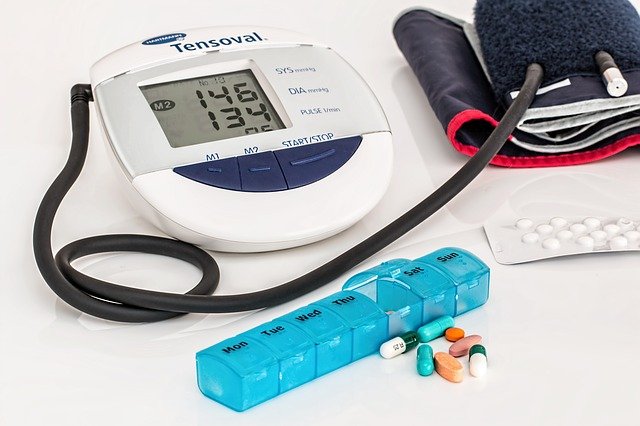High blood pressure is a major health issue and it matters because of the debilitating effects that it can produce 7 out of 10 people on their first heart attack have high blood pressure also 8 out of 10 people getting their first stroke are also dealing with high blood pressure
Hypertension is a disease that is caused by an individual’s lifestyle. Blood pressure is also referred to as a “silent killer,” so it’s important to get it monitored regularly and keep it under control.
To begin, it is important to comprehend the physiological aspects of blood pressure in Ayurveda, which is based on the Tridosha theory. The blood is first expelled from the heart, then distributed to all parts of the body, and then returned to the heart through the blood vessels known in Ayurveda as “Sirah.”
The role of Samana Vata regulates the return of Rasa (blood) to the heart. Blood pressure is defined as the lateral pressure exerted by the flow of blood on the artery walls.
High blood pressure, according to Ayurveda, is caused by an imbalance of two doshas: Vata and pitta. Ayurvedic treatment for high blood pressure aims to get these doshas back into balance. High blood pressure may be caused by an imbalanced Kapha.
If you already have hypertension, Ayurveda recommends the following basic lifestyle changes to help you manage your blood pressure effectively.
1. Dinacharya
It is important to follow a proper daily routine also called dinacharya in Ayurveda to keep the blood pressure in control. As a result, avoid all unnecessary distractions that prevent you from keeping to a balanced daily routine. Fix a regular sleep-wake routine, as well as a specific time slot for working out and meditation. Avoid the use of electronic devices like mobile phones and television at least one to two hours before bedtime, and go to bed early. Make it a routine to get up early every day and do some kind of light exercise or yoga. This dinacharya keeps the body’s natural biorhythm in control and maintains regular blood pressure levels.
2. Try to control stress and anxiety
Hypertension is linked to stress and anxiety. You can reduce the level of stress and anxiety by practicing 15-20 minutes of Yoga, Meditation, and Other breathing techniques every morning. This will helps you to relax your body and soul.
3. A good night’s sleep
A good night’s sleep will make you feel stronger, develop your memory, minimize stress and blood pressure, and enhance your immune system.
According to Ayurveda, a healthy sleep pattern assists in the balance of doshas as well as the creation of Ojas (energy). This is why, if you don’t get enough sleep at night, you may feel tired or fatigued the next morning.
Lack of sleep can also limit your creativity and your problem-solving ability which could hurt your work performance. Without adequate sleep, you may feel irritable and also increase the levels of stress hormones in your body. The lack of sleep can also lead to more serious health problems like high blood pressure or even increasing your chances of developing cardiovascular disease.
4.‘Abhayanga’(Self body massage) can help
Hypertension may be caused by a vitiated Vata dosha. Therefore, in addition to gentle morning exercises, try ‘Abhayanga’ (self-massage) with sesame oil, which aids in the balance of the doshas in the body. Abhyanga is also helpful in enhancing blood supply, which helps in the reduction of hypertension.
5. Do Exercise
Daily exercise is beneficial to both the mind and body. It not only contributes to physical health but also aids in the reduction of high blood pressure. Gentle activities such as 30 minutes of brisk walking have been shown to lower blood pressure and enhance heart health.
6. Focus on the diet to maintain ideal body weight
Healthy body weight is important for preventing diabetes and high blood pressure. To do this, stay away from fast food, as they lack ‘prana.’ Replace them with fresh vegetables and fruits that have been cooked in a safe way
These are some Dietary changes suggested by Ayurveda to re-balance the vitiated doshas in the case of a person with high blood pressure.
• Increase the use of Vegetarian foods in your diet.
Have bitter gourd, parsley, garlic, and drumsticks, as well as watermelons, guavas, bananas, and grapes as vegetables and fruits. Dairy products like milk, cottage cheese, and butter are also excellent additions.
• Avoid Caffeine
However, take care to cut down the use of caffeine, as it is believed to further irritate the system and shoot up the blood pressure.
• Reduce intake of salt/egg and Red meat/ Alcohol
salt intake that’s more than 3 grams per day increases the risk of hypertension and controlling sodium and diet lowers blood pressure. Always check the sodium content of your food keeps looking at those levels. So avoid salt in your diet. Also when attempting to control the doshas and avoid the impact of high blood pressure and attacks, remember to control the use of eggs and red meat in your diet.


Leave a Reply